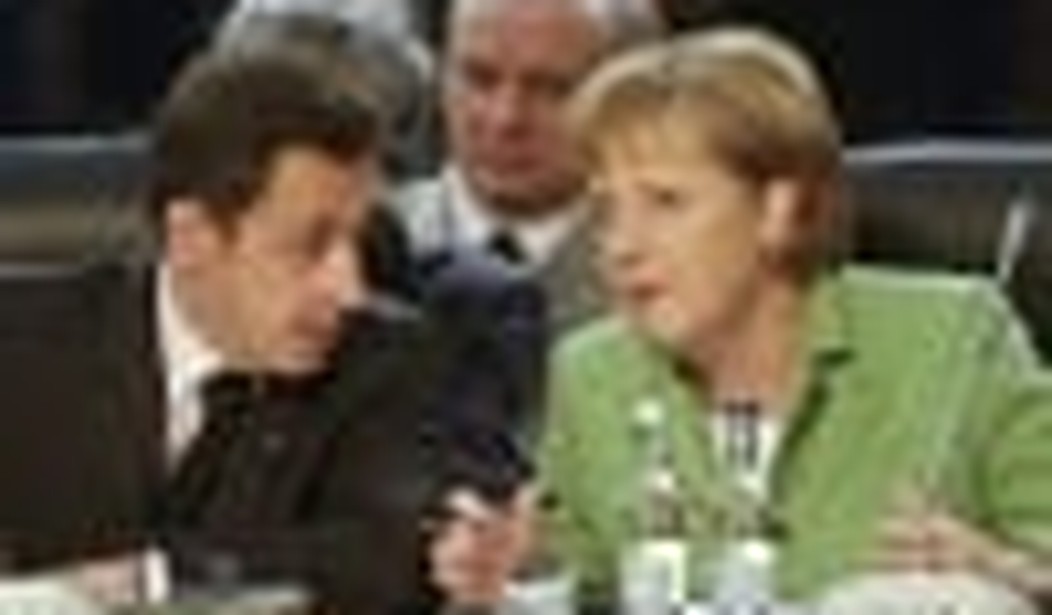Europeans have been hyperventilating over their self-perceived “victories” vis-à-vis the United States at the recent NATO Summit in Romania from April 2-4. “France and Germany Thwart Bush’s Plans,” ran a triumphant headline in the Hamburg-based Der Spiegel. “Europe Waits Out the Bush Administration,” read another. “Only One Lame Duck Here” said the London-based Guardian in commentary that waxes giddy about Russia’s growing stranglehold over Europe. “NATO Should Disappear” said the Madrid-based El Pais.
But behind the spin, the 26-member NATO Summit (arguably the most important such gathering since the end of the Cold War) exposed a security-dependent Europe that is divided, weak, and fickle above all else.
Consider Spain, for example, where newly re-elected Socialist Prime Minister Jose Luis Rodriguez Zapatero was far less concerned about Spanish (or European) security than about getting some one-on-one face-time with US President George W Bush. Zapatero, a self-proclaimed feminist pacifist who is arguably the most anti-American leader in Europe today, is (unsurprisingly) one of the only such Europeans never to have been invited to the White House.
But in the Byzantine logic of Spanish politics, that elusive visit to the Oval Office (to see an American president who is broadly despised by most Spaniards) also happens to be the main litmus test by which Spaniards will judge whether Zapatero gets promoted from provincial politician to international “statesman” during his second term.
Thus Zapatero’s permanent non-relationship with the most powerful leader in the free world has become something of a media obsession in Spain, with the issue generating many miles of ink in national newspapers.
Imagine, then, the internecine recriminations when Zapatero’s much-vaunted “mini-summit” with Bush lasted all of about three seconds…just enough for Bush to shout three words (which brings to a grand total of 18 words the two leaders have exchanged during the last four years) that appeared in newspaper headlines all across Spain: “Hola, Hola, Felicidades.” (“Hello, Hello, Congratulations,” referring to Zapatero’s re-election.)
Zapatero then took to the podium and tried to persuade bemused members of the Alliance… to merge NATO with the United Nations! And, just for good measure, the prime minister also announced that Spain would not be sending more troops to Afghanistan, with or without the UN.
Not surprising, then, that Zapatero was captured in a politically devastating Summit photograph sitting in isolation, while the rest of the leaders present were huddled around Bush at the other end of the conference hall. The picture, which made the front page of every newspaper in Spain, opened up yet another pained debate about Spain’s declining influence in the world since Zapatero took office.
Then take Greece. It refused to allow Macedonia to join NATO because Greece wants its northern neighbor to change its name, which Greeks say jeopardizes their claim as the only the rightful descendants of Alexander the Great (356-323 BC) and Aristotle (384-322 BC).
The controversy erupted in 1991, when the former Yugoslav republic declared its independence from Belgrade and took the name Republic of Macedonia. Although more than 120 countries have now recognized the Republic of Macedonia under its current name, Greece says the name proves that Macedonia harbors implicit territorial claims on the northern Greek region also known as Macedonia. Never mind that by joining NATO, Macedonia would provide Greece with much-needed stability on its northern border.
Then consider Germany and France, arguably the greatest free-riding beneficiaries of American security since World War II. At the Bucharest Summit, they (together with Spain) refused to extend NATO Membership Action Plans to Georgia and Ukraine because they were afraid of provoking Russia, thanks to Europe’s growing dependence on Russian energy.
Germany, for example, already imports 35 percent of its oil and 40 percent of its natural gas from Russia, more than any country in Western Europe. The problem of energy dependency is being exacerbated by leftwing energy policies that are phasing out the country’s production of nuclear energy in favor of increased reliance on fossil fuels. Indeed, Germany’s (and Europe’s) dependence on Russian energy imports may reach 70 percent by 2020, which (if current German behavior is any gauge) will give Russia a de facto veto over decisions on German (and European) security.
Europeans, in any case, know that keeping Georgia and Ukraine out of NATO will not appease Russia for very long. Indeed, the Germans appear to be looking for a face-saving way out of Europe’s long-term geo-strategic dilemma. On March 4, German Foreign Minister Frank-Walter Steinmeier gave a speech titled “Towards a European Ostpolitik” in which he suggests that Europe’s future lies in staking out a position mid-way between the United States and Russia. Say what?
Well, if Germany insists on turning Europe into a province of Russian, then debates over the future of NATO will be moot anyhow.
In France, meanwhile, the government on April 8 faced down a vote of no confidence, as leftists accused French President Nicolas Sarkozy of a dangerous “Atlanticist drift” that risked turning France into Bush’s poodle. Socialist leader François Hollande said Sarkozy decided to send 700 French troops to Afghanistan “under pressure from the Americans” and that France risked losing its independence on the world stage.
With allies like these, expect trouble ahead for transatlantic relations, regardless of who occupies the White House next January.
Soeren Kern is Senior Fellow for Transatlantic Relations at the Madrid-based Grupo de Estudios Estratégicos / Strategic Studies Group









Join the conversation as a VIP Member